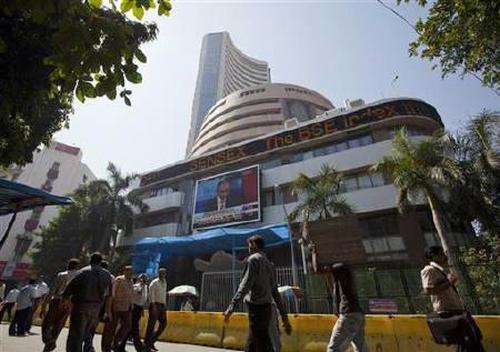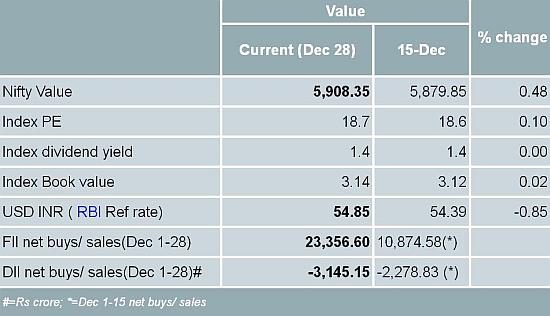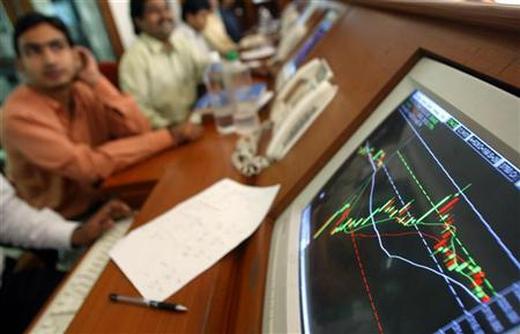Photographs: Vivek Prakash/Reuters Devangshu Datta in New Delhi
With the government surviving the winter session, two events will decide the movement of stock market - outcome of US fiscal cliff and RBI's stance on the rate cut.
The market continued to mark time as the last settlement of 2012 passed by. There was negligible change in net index levels.
Most traders are awaiting some resolution of the US fiscal cliff. Given the January 1 deadline, there could be decisive movements next week.
If the impasse continues, global markets will head down, and India will also move down in step. On the other hand, a bipartisan resolution could trigger a relief rally. Unpredictable things may happen to the dollar- rupee rates, as well.
If there are foreign institutional investor (FII) outflows from Indian equity as a result of the US falling off the cliff, the dollar would strengthen against the rupee in the short term as a result of redemption pressures.
On the other hand, if the situation is resolved, there would be an inflow of FII-driven liquidity causing the rupee to strengthen.
The US fiscal cliff and other global news flows are more likely to affect the Indian markets than domestic events. Japan has another interesting currency situation.
"Everyone" expects a liberal monetary policy from the new government, and that could mean a further fall in the yen against the global currency basket.
In 2012, the yen was the only major currency to lose ground against the rupee and this trend could be accentuated if Japan does indeed loosen up money supply.
Ta-Ta, Ratan: Tribute to an iconic Indian
...
Two events that will decide stock market's fate in 2013
Photographs: Business Standard
In the home front, the United Progressive Alliance (UPA) survived the winter session of Parliament and managed to get some legislation passed. The passage of the banking Bill is a good policy signal. However, it might not lead to much change on the ground.
The Reserve Bank of India (RBI) is notoriously cautious, and that is unlikely to change even if the law has been amended. The central bank has a lot of things on its plate already.
Will it cut rates in January? How will it manage the five-year transition to Basel-III compliance, given the number of public sector banks with weak balance sheets and the inability of the government to recapitalise them?
Basel-III will create a lot of predictable targets and opportunities for traders within the financial sector over the long term.
If new banking licences are offered, there are several non-banking financial companies (NBFCs) that are likely to see share price volatility.
As to rating cuts, the central bank has sounded a recent note of caution on this account. If it doesn't cut policy rates in January, that would be pretty much be seen by traders as an open invitation to short the Bank Nifty and NBFCs.
The end of the winter session means that the UPA will survive till the Budget session at least. That means some political continuity through the next quarter, though the government has suffered perception damage owing to its mishandling of the gang rape of a 23-year old in Delhi and protests in its aftermath.
Ta-Ta, Ratan: Tribute to an iconic Indian
...
Two events that will decide stock market's fate in 2013
Photographs: Jonathan Ernst/Reuters
The 2013 Budget is likely to be a pre-election exercise balancing entitlements and sops while trying to ensure India doesn't fall off its own version of the cliff.
The details in the long-delayed Twelfth Plan document suggests that the UPA is living in Lala-land in terms of optimistic projections.
It's unlikely that the Budget projections will revert to reality. As with the Plan, the market is likely to be sceptical about an optimistic Budget.
However, it must be said there has been some sort of action on the energy subsidy. A politically feasible idea of rationalising diesel subsidy by a series of gradual hikes has been mooted.
If this is implemented, it could cut the subsidy burden. The share prices of public sector oil and gas companies have responded positively to the concept, and one must hope the follow through is credible.
In other corporate news, the CARE initial public offering (IPO) has been an unqualified success with the share listing at a healthy premium to issue price.
In contrast, the Bharti Infratel IPO has been a disaster story with primary investors seeing massive capital loss on listing.
Long-term investors will probably be reviewing valuations across the Tata group through the next year with Cyrus Mistry taking over in corporate India's biggest management transition.
It'll be interesting to see how the new man handles India's biggest brand. He is likely to be second-guessed mercilessly by the market on every decision.
Investors with long memories will recall that several Tata majors underperformed in terms of capital returns for the first three or four years after Ratan Tata took over.
Ta-Ta, Ratan: Tribute to an iconic Indian
...
Two events that will decide stock market's fate in 2013
Image: Stock brokers at a brokerage firm in Mumbai.Photographs: Punit Paranjpe/Reuters
Institutional attitude appears unlikely to change much in the near term. FII buying will have to maintain momentum through 2013 if the equity market is to stay bullish.
It appears unlikely that domestic institutions will buy equity to any great extent, until and unless the RBI cuts policy rates.
The Nifty stayed stuck with a narrow range as mentioned above. It has stayed above 5,820, which was the level from which it broke out in late November. It has tested resistance above the 5,950 level, with the current 52-week high at 5,965.
Range-trading between 5,825-5,965 cannot continue indefinitely. If there is no breakout or breakdown after the US fiscal cliff, RBI's next credit policy will be a possible trigger.
A move till 6,150 or 5,650 could occur within three sessions once the pattern of range trading ends. Bigger swings are also entirely possible.
January could be a swing month, with the Nifty moving by 5 to 10 per cent in either direction if the US situation and RBI credit policy are aligned. Every trend-following system signals staying long at the current moment with stop losses at say, Nifty 5,750-5,775.
If the market does drop below those levels, I would look to go short with a fair degree of confidence. Strangles - that is, combinations of deep long Nifty puts and deep long Nifty calls - may make sense as well, since this would take care of a swing in either direction.






article